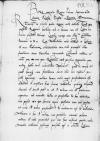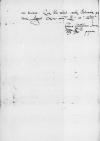Quod ipsa ⌊praefecta Rogosnensis⌋ hactenus ab ⌊eo homine⌋
non sit libera, exanimo profecto dolemus. Locutaeque eramus cum magnifico ⌊castellano Posnaniensi⌋ ea de re. ⌊Qui⌋, existentibus nobis adhuc in ⌊Lobszow⌋ et nunc ⌊Piotrcoviae⌋ solicitantibus eum, nobis promissit illuc familiarem suum discretum cognomento Caczcowski mittere, ut omnia, ... illegible⌈...... illegible⌉ quae cum ⌊ipsa Rogosnensis⌋ ad praesens aguntur quomodoque facta sunt, certo certius exploraret. Quid in causa sit, quod hucusque eum familiarem suum illic non miserit ms. misserit(!)
⌈miseritmiserit ms. misserit(!)
⌉, profecto ignoramus. Nullum tamen nobis magis praesentaneum esse auxilium et consilium ⌊huic feminae⌋ videretur, quamque aliquomodo clancule et secreto possit se ad Paternitatem Vestram ceu ad patronum exportare, ubi manendo tutius ac perfectius de hac violentia sua possit cum ipso homine agere, praesertim cum non agitur (ut nobis Paternitas Vestra perscribit) de matrimonio, nisi de violentia. Ac tamen si hoc Paternitati Vestrae non probatur, inveniat alium modum et nobis perscribat. Quo ⌊eius⌋ has miseras partes nostro auxilio sublevare possemus, profecto ipsi in omnibus libenter  BCz, 3465, p. 344 non deerimus.
BCz, 3465, p. 344 non deerimus.
Quae bene valeat.
 BCz, 3465, p. 344 non deerimus.
BCz, 3465, p. 344 non deerimus.


